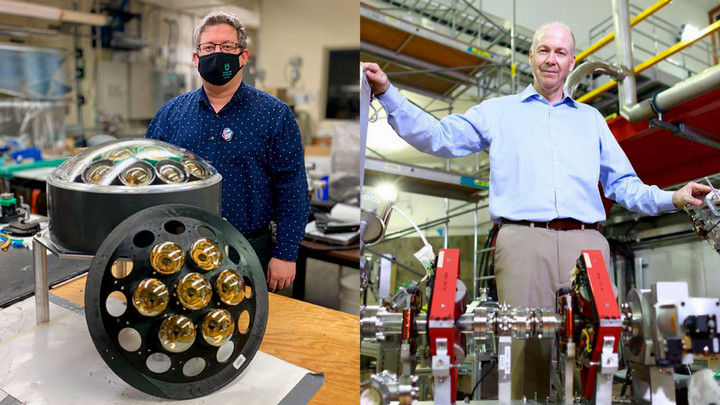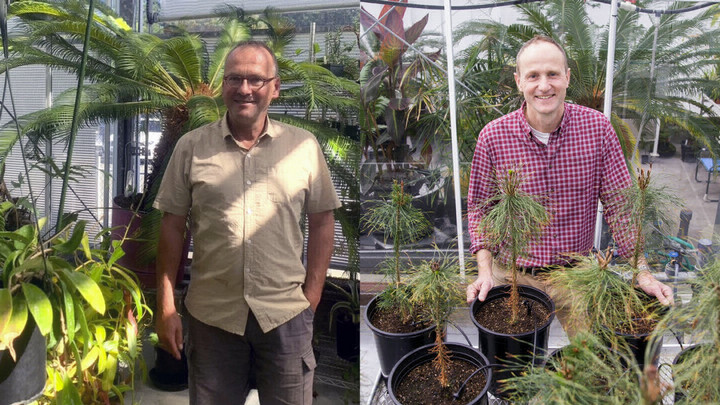UVic researchers partner with physicists around the world and plant scientists across the country
March 13, 2024
The Honourable Pablo Rodriguez, Minister of Transport and Quebec Lieutenant, announced $515 million in infrastructure support for 100 projects at 32 post-secondary institutions and research hospitals across the country, as part of a larger federal funding announcement that will help Canada remain at the forefront of scientific exploration, technology development, and knowledge generation.
UVic scholars are leading two projects funded through the Canada Foundation for Innovation (CFI) Innovation Fund that will receive a combined $7.6M.
Hyper-K: high-performance calibrations for sub-atomic physics

Principal Investigators: Mark Hartz, Dean Karlen
“Water Cherenkov Calibration for Hyper Kamiokande” $6.36M
Canada is one of 20 countries participating in an ambitious experiment to study neutrinos and possibly discover that protons decay. The goal: to deepen our understanding of the workings of the universe. At the Hyper-Kamiokande (Hyper-K) observatory under construction near Kamioka, Japan, scientists from around the world expect to significantly advance our understanding of the ghost-like subatomic particles called neutrinos, and aim to answer one of the most profound questions in science: why did the universe evolve with a preference for matter?
UVic is already leading the first stage of the Canadian contribution to the international Hyper-K project, funded in 2020 by the Canada Foundation for Innovation (CFI). This second stage, with new support from CFI, includes constructing and installing precision calibration systems in the Hyper-K particle detector, to ensure the accuracy of the measurements performed by the Hyper-K instruments.
The calibrations include high-resolution single-photon light detectors that can measure the position of all elements in the instrument with one-centimetre accuracy over distances of tens of metres.
Along with enabling the Hyper-K physics projects the program also trains scientists and engineers who will advance both theoretical knowledge and applications in industry and society and the new infrastructure will allow other, broader, applications. The water quality inspection system, for example, is being further developed to monitor drinking water and identify the presence of impurities.
“This announcement for additional funding comes at an exciting time for the Hyper-K experiment, as construction is now underway,” says UVic’s Dean Karlen, one of the principal investigators.
Pests, pathogens and resilience: protecting BC’s trees and agriculture

Principal Investigators: Jürgen Ehlting, Peter Constabel
“Environmental Simulation Facility for Climate Impact Research on Plant Health” $1.25M
Climate change is creating new environmental stresses for plants, and it’s enabling pests and pathogens to expand in places and ways that threaten our forests and food crops. “Forests have absorbed a staggering amount of anthropogenic carbon dioxide emissions (rivaled only by the oceans), but we are at a tipping point now with forests turning into carbon sources rather than being carbon sinks. It is thus imperative to increase stress resilience of forests and agricultural systems,” says Jürgen Ehlting, director of the Centre for Forest Biology (CFB) at the University of Victoria.
The Canada Foundation for Innovation has announced its support for the Environmental Simulation Facility, a project that brings together academic researchers with scientists from the provincial and federal governments in a unique partnership. Seventeen customized environmental chambers will allow researchers to test the effects of multiple environmental stresses on plants and identify mechanisms that underlie the plants’ responses and their adaptations. “Within these chambers, we will be able to control extreme temperatures from -15°C to +45°C at very high light intensities,” says Peter Constabel, chair of the Department of Biology and member of the Centre for Forest Biology. “We can control atmospheric CO2 levels and humidity as well as light composition from UV to infra-red. And we will be able to work with plant pests and pathogens under controlled conditions.”
UVic’s CFB will be home to Node 1 focusing on abiotic stress, with two existing chambers and eleven new chambers. Node 2, located in a new facility under construction at the Centre for Plant Health of the Canadian Food Inspection Agency in North Saanich, BC, will focus on biotic stress and include two new chambers to support research focusing on plant pathogen work.
To improve reforestation success and to enhance resilience of forest trees and perennial food crops such as fruit trees, blueberries and grapes, the research will explore complex plant stress responses at the genetic, biochemical and physiological levels, testing how they will cope under future climatic conditions.
Scientists will develop novel detection and monitoring tools and investigate how emerging pests and pathogens affect plants already under stress in conditions predicted by climate change models. Using research outcomes, they’ll assess risk for pathogen spread and increase tree and crop plant resilience, for example, by informing forest tree breeding programs.
“We are thrilled about this opportunity,” says Ehlting. “Together with our partners at the Centre for Plant Health, the Pacific Forestry Centre and the BC Ministry of Forests, we will have some of the best plant growth facilities in the country serving an outstanding concentration of crop plant and forest researchers on southern Vancouver Island and beyond.”
UVic researchers are also collaborating on an additional three projects, aligned with the university’s expertise in climate and health.
- Julia Baum, Amanda Bates, “Ecocosms and Mesocosms jointly Predict Ocean Weather and Ecological Response (EMPOWER)”
- Jennifer Cobb, “TRAC: Targeting Repair in Aging and Cancer”
- Colin Goldblatt, “The HAWC satellite mission: High-altitude Aerosols, Water vapour, and Clouds”
Rachel Goldsworthy
